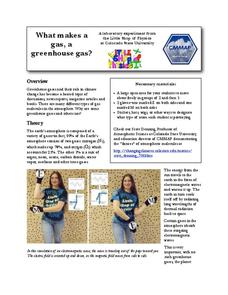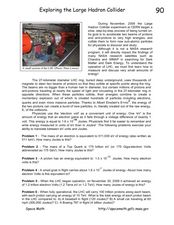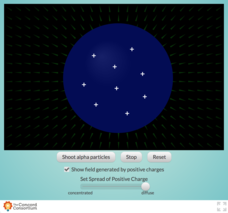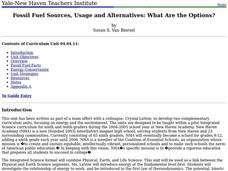Cornell University
Thin Films
Combine mathematics and science to calculate measurements of unmeasurable materials. Individuals use knowledge of density and volume to determine the thickness of the film used in production. They also apply stoichiometry to...
Curated OER
Observation and Inference
Assess your young scientists' understanding of the difference between observation and inference with this 20-question multiple choice quiz. It reviews a variety of physics and astronomy concepts, such as solar eclipses and sunspots, the...
Curated OER
Rocks and Minerals
Review the difference between rocks and minerals using this resource. Learners identify and investigate the physical properties of these objects. They create a Venn diagram to compare and contrast types of rocks. This is a motivating way...
Colorado State University
What Makes a Gas, a Greenhouse Gas?—The Carbon Dioxide Dance
Investigate a heated topic in environmental science. Scholars team up to play the parts of gas molecules in the atmosphere. As the teacher moves about, acting as the electromagnetic wave, learners react as their molecules would to the...
Curated OER
Exploring the Large Hadron Collider
On this physics handout, pupils read about the Hadron Collider used to make new sub-atomic particles by accelerating protons. They solve 6 math problems that include translating electron volts to Joules. This is geared toward high school...
Concord Consortium
Concentrating Charge and Electric Fields
How did Rutherford determine that the nucleus was the center of an atom? Take a look inside the famous Gold Foil Experiment with an interesting interactive. Learners fire a beam of alpha particles at a nucleus containing variable...
Curated OER
What Do Magnets Do?
Second graders discover the physical properties of magnets. In this physics instructional activity, 2nd graders investigate the differences between natural and man made magnets and the uses of each. Students complete 4...
Curated OER
Roller Coaster Simulator for the Magnetic Chalkboard: Construction Plans
Students watch a demonstration that allows the teacher to show Galileo's inertia experiment and how and why the hills on roller coasters are designed as they are. The roller coaster simulator can be mounted on a magnetic chalkboard;...
Curated OER
Electromagnets
Students improve their science skills by designing an experiment for the relationship between electricity and magnetism. In this science skills lesson, students discuss the scientific method and use the given materials to complete an...
Curated OER
Physics: Force and Motion
Students use the internet to discover the basic concepts in physics. They complete interactive simulations where variables can be changed. They answer comprehension questions to end the lesson.
Curated OER
The Magnetic Sun
Learners follow steps to build a simple version of a magnetometer, an instrument capable of detecting areas of strong magnetic field. Students use the magnetometer to investigate models of the Sun and examine images of the Sun.
Curated OER
Magnetic Attraction
Second graders create a hypothesis on what objects will attract to magnets. In this magnets lesson plan, 2nd graders use a computer program to create a hypothesis as to what will attract or unattract magnets. For an extension, they test...
Curated OER
Deducing Induction
Students examine how changing magnetic fields induce currents in
loops and coils, determine orientation and magnitude of magnetic field,
describe Michael Faraday's experiments that led to conclusion that changing
magnetic force induces...
Curated OER
Magnetorheological Fluids
Young scholars conduct a series of experiments on magnetorheological fluids. In this physics lesson, students explain how these fluids behave in varying magnetic field strength. They give practical applications of magnetorheological fluids.
Curated OER
Inductance
In this inductance worksheet, students answer 20 questions about magnetic fields as they relate to inductors, inertia, transistors, and the flow of current through circuits.
Curated OER
Applied Science - Physics (K) Post Lab
Students are introduced to electricity. In this electricity instructional activity, students listen to the book Switch on, Switch off by Melvin Berger and discuss the use of electricity in light switches. They create a picture of...
Curated OER
Fossil Fuel Sources, Usage and Alternatives: What are the Options?
Students identify the different sources of fossil fuels. In this environmental science instructional activity, students research about how these impact our environment. They explore renewable energy sources that could replace fossil fuels.
Curated OER
Circuits and Electromagnets- A Total Inquiry Investigation
Students investigate how electromagnets work. In this circuits and electromagnets lesson plan, students complete a series of four challenges using electricity and magnetism.
Curated OER
Applied Science -Physics (2B) Pre Lab
Second graders look at different types of energy. In this energy lesson, 2nd graders define energy and the difference between kinetic and potential energy. They see examples with falling books and a slinky.
Curated OER
Magnetic Art
Students explore the different fields of force of magnets and magnetized objects through the movement of metal filings. They create a work of art.
Curated OER
Amazing Magnets Crossword Puzzle
In this physics worksheet, students identify and write the correct word for each description related to magnets. There are 12 descriptions to complete.
Curated OER
Electricity and Magnets
In this physics review worksheet, students compare average and instantaneous speed, review Newton's laws, electricity, and magnets. This worksheet has 12 fill in the blank, 8 short answer questions, and 6 problems to solve.
PHET
Soda Bottle Magnetometer
Introduce learners to set of complete instructions that describe how to build a magnetometer that works just like the ones professional photographers use to predict auroras. The diagrams are wonderfully descriptive, and the written...
Curated OER
Magnets
Second graders classify objects and formulate hypotheses regarding various materials and their magnetic properties. They complete a worksheet and watch a video.

























